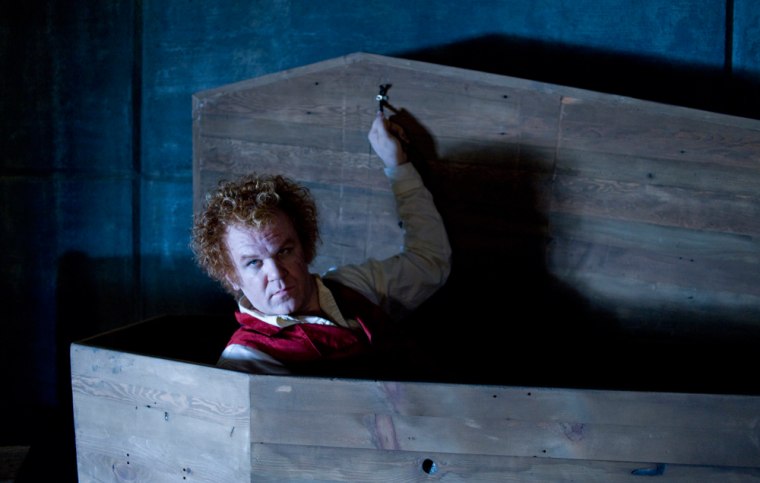Most college students put in a monster study session or two. Marina Levina's students get to spend sessions studying monsters.
The course, "Film Topics: Monster Movies," at the University of California, Berkeley, is one of a number around the country that mix scares and scholarship, using zombies, vampires and other ogres to study popular culture.
And, no, it's not a frightfully easy course, says Levina.
"For a lay person, I suppose it does sound like, What? Do you watch horror films all day?" she says. "But it's a really tough class. Students don't automatically do well in it because it does involve a lot of serious theory."
The class, an elective open to mass communication/media studies majors, has space for 50 students and fills up quickly. Students watch monster films and write about what the creatures represent. They also make their own monster films as a final project.
As Halloween approached, the class was studying zombies, looking at the horrors they have represented.
Reflection of our times?
In the 1980s, for instance, zombies personified mindless consumerism. After the Sept. 11 attacks, the raging undead represent "this post-apocalyptic nightmare where we lose control," Levina says.
Not the most attractive characters, zombies mostly want to destroy humanity and have developed disturbing eating habits — they picked up a taste for brains in 1984's "Return of the Living Dead."
Vampires, on the other hand, are "sexy and hot, they are those things that we would like to be ourselves but can't be," says Levina.
Students find the gore curriculum thought provoking.
"It's my favorite class, even though it is theory heavy," said Azeta Hatef, one of Levina's students.
Maureen Grzan was intrigued by a segment on female werewolves; it turns out they're not all hairy guys. For her class project, she's been inspired to take a different look at another legend, reworking "Hansel and Gretel" — this time, the children are evil.
There's more than monsters to Levina, who teaches an introductory course on media studies as well as one on visual media. In class, she examines zombies as a proxy for viruses, drawing on her specialty in the critical study of science and technology.
'Ultimate horror'
At Columbia College Chicago, Brendan Riley teaches a class exclusively on the zombie zeitgeist, starting with movies of the 1930s.
His media studies class, taught in an intensive January session, meets for several hours each day and enrollment usually takes a few rounds. Eager students sign up, get his e-mail about the amount of writing and then back out, making room for more.
Zombies are scary because "they are human and not human at the same time," Riley says. "Freud calls that the 'uncanny.' We're always afraid of losing control."
At Middle Tennessee State University, English professor David Lavery focuses on a late-1990s incarnation of vampires — the TV series "Buffy the Vampire Slayer" that follows the adventures of a young woman chosen to fight evil.
Vampires can be used to look at various disciplines, from philosophy to literature to pop culture, says Lavery, who uses the TV series in his graduate courses and also teaches an undergraduate "Buffy" class as an elective in English.
"They relate better so often to these things than they do to 'King Lear,' and as a result I think they're more engaged," he says. "I want them to read 'King Lear,' and I want them to be engaged with that, too, but you've got to get them hooked first."
Some students sign up thinking they're going to get an easy A and then find out "they actually have to read and write."
"That," he says with a laugh, "is the ultimate horror."
